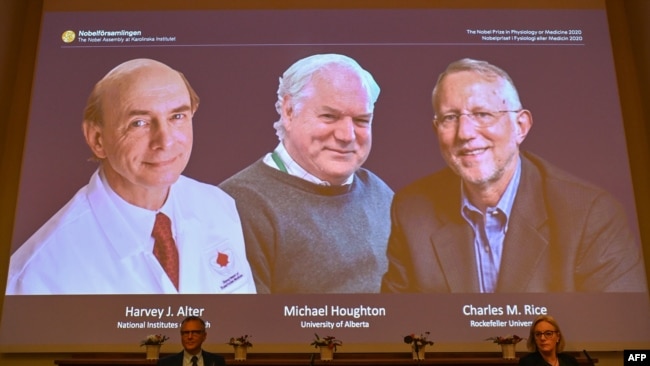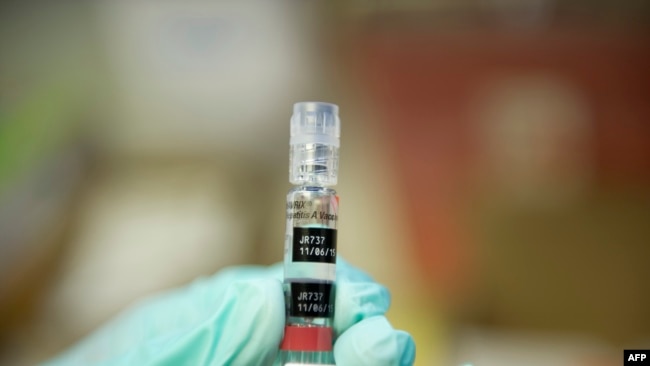続々とノーベル各賞が発表されていますね。
今回はノーベル医学賞です!!!
。。。実は。。。20年前に叔父がC型肝炎で亡くなってしまいました。
なので、感慨深いです。。。
早速、VOAニュース!!!
C型肝炎ウイルスの特定でノーベル医学賞を3人が受賞
Three Awarded Nobel for Medicine for Identifying Hepatitis C Virus
October 05, 2020

(写真)
ノーベル委員会のパトリック・エルンフォース委員(左)とグニラ・カールソン・ヘデスタム委員は、2020年ノーベル医学生理学賞の受賞者を表示するスクリーンの前に座っています(左から右へ)アメリカ人のハーヴェイ・アルター、イギリス人のマイケル・ホートン、アメリカ人のチャールズ・ライスの3人。
3人の科学者がC型肝炎の原因となるウイルスを特定したことで、月曜日に2020年のノーベル医学賞を受賞しました。
C型肝炎ウイルスは肝臓病の主な原因であり、世界中の何百万人もの人々に影響を与えています。
ノーベル委員会は、ハーベイ・J・アルターとチャールズ・M・ライスの2人のアメリカ人と、イギリス生まれの科学者マイケル・ホートンを、共同受賞者として指名しました。
委員会は、3人が血液を媒介とする肝炎の主要な原因を特定したと指摘しました。その原因は、以前に発見されたA型肝炎ウイルスとB型肝炎ウイルスでは説明できないといいます。
委員会によると、3人の研究は1970年代と1980年代にさかのぼり、血液検査や新薬の開発を可能にし、何百万人もの命を救ってきたと述べています。
世界保健機関(WHO)は、世界では7000万人以上のC型肝炎の症例があり、毎年40万人の死亡者が出ていると推定しています。
肝炎は、炎症、または肝臓の感染症の用語です。肝炎ウイルスは主にA型、B型、C型、D型、E型と呼ばれる5種類があります。
A型肝炎ウイルスは、通常、水や食べ物に含まれる人間の排泄物を介して感染します。しかし、このウイルスが致命的になるのは1%未満のケースです。A型肝炎に感染した多くの人々は決して病気になることはありません。そして、それらの人は通常、2ヶ月以内に回復します。
B型肝炎とC型肝炎は、感染した人からの血液が別の人の体に入ると広がります。血がついているかもしれないパーソナルケア製品を共有している場合は、B型肝炎に感染します。
C 型肝炎は、肝臓がんや肝硬変の主な原因で、瘢痕組織がゆっくりと健康な細胞に置き換わる状態です。やがて、肝移植手術が必要になることもあります。
今年のノーベル医学賞は、コロナウイルスのパンデミックのために特別な重要性を持っています。この健康危機は、世界中の社会や経済にとって医学研究がいかに重要であるかを示しています。また、1つのウイルスが地球全体に深刻な影響を与えることも証明しました。
「彼らの発見のおかげで、ウイルスに対する高感度の血液検査が可能になり、世界の多くの地域で、輸血後肝炎を本質的に排除することができました」と委員会は述べています。
この発見はまた、C型肝炎を対象とした抗ウイルス薬の迅速な開発にもつながったと付け加えています。「歴史上初めて、この病気を治すことが可能となり、世界の人口からC型肝炎ウイルスを根絶する希望が高まったのです。」
ハーヴェイ・アルター氏は、米国国立衛生研究所で受賞研究を行いましたが、そこで彼は今日も活躍しています。ライス氏は、ミズーリ州セントルイスのワシントン大学で肝炎の研究に従事しました。現在はニューヨークのロックフェラー大学に勤務。イギリス生まれのホートン氏は、カリフォルニアのカイロン・コーポレーションで学んだ後、カナダのアルバータ大学に移りました。
アルター氏が話したのは、ストックホルムの ノーベル委員会からの早朝の電話についてでした。 最初の二回電話が鳴った時は無視して、三回目に”怒って”出たと。彼の怒りは"1秒ほどで治まった "と付け加えています。
「それはとても別世界のようなものです 」と彼は電話について語ったくれました。「絶対に起こらないと思っていること、時にはそれが起こるに値しないと思っていること、それが起こるのです 」と彼は付け加えました。
「何もかもがひっくり返ってしまうこのクレイジーなCOVIDの年に、これは私にとってもう一つの素敵なひっくり返りだ」 とアルター氏は付け加えました。
ジョン・マクラクラン氏は、スコットランドのグラスゴー大学でウイルス性肝炎の教授を務めています。彼は、受賞者を”先駆者”と呼び、彼らの発見が世界的にこの病気と戦うことを可能にしたと述べています。2016年、WHOは2030年までに肝炎に打ち勝つための行動計画を承認しました。
マクラクラン氏は、「それは、ウイルス感染症を薬だけでコントロールできる可能性がある初めてのことを意味します」と述べています。
ノーベル委員会メンバーのパトリック・アーンフォース氏は、医学賞とCOVID-19と戦うためのワクチンを見つけるために世界中の科学者たちの努力との間に類似点があると指摘しています。
「最初にすべきことは、原因となるウイルスを特定することです 」と彼は記者団に語りました。「それができれば、それ自体が、この病気を治療する薬の開発やワクチンの開発の出発点になります」とアーンフォース氏は述べています。
2020年のノーベル医学賞は、1901年以来111回目の受賞となります。受賞者には、賞金110万ドルのうち、それぞれが平等に分配されます。
Three Awarded Nobel for Medicine for Identifying Hepatitis C Virus
 Nobel Committee members Patrik Ernfors (L) and Gunilla Karlsson Hedestam sit in front of a screen displaying the winners of the 2020 Nobel Prize in Physiology or Medicine (L-R) American Harvey Alter, Briton Michael Houghton and American Charles Rice during a press conference at t
Nobel Committee members Patrik Ernfors (L) and Gunilla Karlsson Hedestam sit in front of a screen displaying the winners of the 2020 Nobel Prize in Physiology or Medicine (L-R) American Harvey Alter, Briton Michael Houghton and American Charles Rice during a press conference at t
Three scientists won the 2020 Nobel Prize for Medicine on Monday for identifying the virus responsible for Hepatitis C.
The Hepatitis C virus is a major cause of liver disease, a condition that affects millions of people worldwide.
The Nobel Committee named two Americans, Harvey J. Alter and Charles M. Rice, and British-born scientist Michael Houghton as joint winners of the prize.
The committee noted that the three had identified a major source of blood-borne hepatitis. It said the source could not be explained by the Hepatitis A and B viruses, which were discovered earlier.
Their work – dating back to the 1970s and 1980s – made possible blood tests and new medicines that saved millions of lives, the committee said.
The World Health Organization (WHO) estimates there are over 70 million cases of Hepatitis C worldwide and 400,000 deaths from it each year.
Hepatitis is a term for inflammation, or an infection, of the liver. There are five main Hepatitis viruses, known as types A, B, C, D and E.
The Hepatitis A virus is usually spread through human waste in water or food. But the virus is deadly in less than one percent of cases. Many people infected with Hepatitis A never get sick. And those who do usually recover within two months.
Hepatitis B and C are spread when blood from an infected person enters the body of another person. People also can get infected with Hepatitis B if they share personal-care products that might have blood on them.
Hepatitis C is a major cause of liver cancer and cirrhosis of the liver, a condition that causes scar tissue to slowly replace healthy cells. In time, the patient may require a liver transplant operation.
The Nobel prize for medicine has special importance this year because of the coronavirus pandemic. The health crisis has shown how important medical research is for societies and economies around the world. It has also demonstrated the serious effects a single virus can have on the whole planet.
“Thanks to their discovery, highly sensitive blood tests for the virus are now available and these have essentially eliminated post-transfusion hepatitis in many parts of the world,” the committee said.
The discovery also led to the speedy development of antiviral drugs directed at Hepatitis C, it added. “For the first time in history, the disease can now be cured, raising hopes of eradicating the Hepatitis C virus from the world population.”
Harvey Alter carried out his prize-winning studies at the U.S. National Institutes of Health, where he remains active today. Rice worked on hepatitis at Washington University in Saint Louis, Missouri. He now works at Rockefeller University in New York. Houghton, born in Britain, studied at the Chiron Corporation in California before moving to the University of Alberta in Canada.
Alter spoke about the early morning telephone call he got from the Nobel committee in Stockholm. The American said he ignored the first two times the phone rang before “angrily” answering it the third time. He added that his anger went away “in about a second.”
“It’s so kind of other-worldly,” he said of the call. “It’s something you don’t think will ever happen and sometimes you don’t think you deserve it to happen and it happens,” he added.
“In this crazy COVID year where everything is turned upside down, this is another nice upside down for me,” Alter added.
John McLauchlan is a professor of viral hepatitis at the University of Glasgow in Scotland. He called the prize winners “pioneers,” saying their discovery had made it possible to fight the disease worldwide. In 2016, the WHO approved a plan of action to beat hepatitis by 2030.
“That would mark the first time we might possibly control a viral infection using only drugs,” McLauchlan said.
Nobel Committee member Patrik Ernfors noted similarities between the medicine prize and efforts by scientists around the world to find a vaccine to fight COVID-19.
“The first thing you need to do is to identify the causing virus,” he told reporters. “And once that has been done, that is, in itself, the starting point for development of drugs to treat the disease and also develop vaccines,” Ernfors said.
The 2020 Nobel Prize in Medicine is the 111th to be awarded for medicine since 1901. The winners will each receive an equal share of the $1.1 million in prize money.
________________________________________________________________
Words in This Story
source – n. where something comes from
borne – v. carried or transported by the thing specified
cirrhosis – n. a serious disease of the liver
scar – n. a mark left on the part of the body after an injury
eliminate – v. remove
transfusion – n. the process of adding an amount of blood to the body of a person or animal, or the amount of blood itself
eradicate – v. get rid of something completely
deserve – v. to have earned or been given something because of the way you behaved or the qualities you have
pioneer – n. a person who is one of the first people to do something
